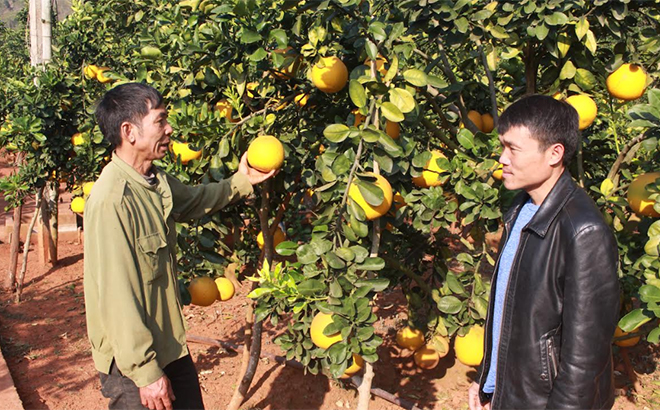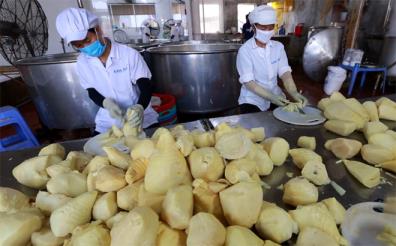YBO - The disadvantaged mountainous province of Yen Bai has encouraged farmers’ engagement to scale up green agricultural production over the last few years.

|
|
Farmers in Son Thinh town, Van Chan district discuss farming techniques according to VietGAP standards.
|
A cooperative for safe orange and pomelo farming called Hong Son has been established in the township of Son Thinh, Van Chan district. The cooperative has recently harvested its 36 hectares of orange and pomelo cultivated under VietGAP standards. Cooperative members have committed to not using herbicides and pesticides at least two months prior to harvest, thus ensuring the fruit quality and having labels of origin on its products. The 17 members are divided into five groups to by turns supervise the production to make sure everything meets the standards, a move to help them build and protect the brand of their products.
Head of the cooperative Ha Khac Lam said "the clean production has helped us to gain reputation in the market which makes sales more easily.”
Despite the COVID-19 impacts, the cooperative has sold over 400 tonnes of orange and 30,000 pomelos, earning 5 billion VND in revenue during the last crop, he said.
The Mu Cang Chai organic agricultural cooperative is another success story. It has more than 2 hectares of organic vegetable farming. Increasing demand for clean agricultural products has motivated the cooperative to pursue this farming model, said Director Bui Thi Hong. The cooperative has received support from the provincial and district administrations to expand organic farming, she added. For example, cooperative members have been trained on how to apply vegetable clean farming techniques and supplied with a automated watering system worth 300 million VND.
More than 130 cooperatives and groups of farmers have adopted advanced quality management practices, such as VietGAP and organic farming. These successful models have provided a premise for districts and communes to shift eyes to environmentally-friendly agriculture, which remains a key task in the province’s agriculture restructuring plan.
In the mountainous areas, the province plans to accelerate the shift from small-scale to commodity production of key products and make the most of local competitive edges in location, climate, nature and cultural diversity to develop high-quality supply chains.
In the lowland, the province will zone off intensive-farming areas for a selection of key products, which will have their production unit codes, barcodes, traceability labels, and advanced farming practices such as VietGAP and GlobalGAP.
It is also seeking to expand pig and poultry farms that ensure biosecurity and are able to enter high-value supply chains; to promote intensive farming of high-value aquatic products; and to launch clean fish products and specialty fish products of Thac Ba lake.
Hoai Anh

In 2024, Nghia Lo Town developed seven new products meeting the 3-star OCOP standard and reevaluated seven products after three years of certification.

Yen Bai develops comprehensive transportation infrastructure, prioritizing projects that connect national highways with the Noi Bai - Lao Cai Expressway, regional linkage projects, and those connecting Yen Bai province with localities in the Northern Midlands and Mountainous region. The focus is on key projects and several important regional and inter-regional connecting roads. As of now, the transportation infrastructure system in Yen Bai has achieved significant progress.

The global Halal market is valued at approximately USD 5 trillion annually, with a strong demand for cinnamon and tea products. This presents significant export opportunities for Yen Bai Province.

In 2024, Yen Bai City achieved vocational training for 2,259 individuals, exceeding the target of 1,790 by 115%. Of this total, 578 people were trained at the college level, achieving 125% of the assigned target of 461.








